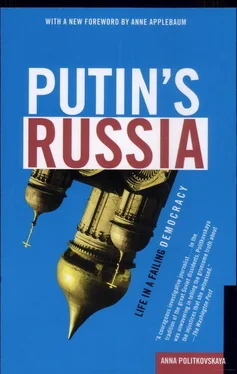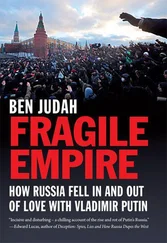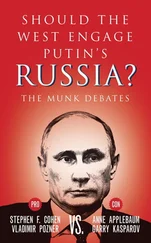No. U-729343: FORGOTTEN ON THE BATTLEFIELD
It is November 18, 2002. Nina Levurda is a heavy, slow-moving woman, a retired schoolteacher, old and tired and with a string of serious ailments. Like many other times over the past year, she has been sitting for hours in the unwelcoming waiting room of the Krasnaya Presnya District Court, in Moscow.
Nina has nowhere else to turn. She is a mother without a son: even worse, without the truth about her son. Lieutenant Pavel Levurda, born in 1975, soldier No. U-729343, was killed at the start of the second Chechen war. What has compelled Nina to spend the past eleven months doing the rounds of legal institutions is not that No. U-729343 was killed but the events surrounding his death and what followed it. Her one aim: to get a precise answer from the state as to why her son was left behind on the battlefield. She would also like to know why, since his death, she has been treated so abominably by the Ministry of Defense.
As a child, Pavel Levurda dreamed of a career in the army—not too common nowadays. Boys from poor families do apply for places at the military academies, but their aim is to earn a degree and then be discharged. The self-congratulatory reports from the president’s office about the increasing competition for admission to military institutes are true. But the situation has less to do with a rise in the army’s prestige than with the abject poverty of those seeking an education. A desire for training but an unwillingness to serve in the army also explains the catastrophic shortage of junior officers in the field. When they graduate from military college, they simply fail to appear at the garrisons to which they have been posted. They suddenly become “seriously ill” and send in certificates testifying to all manner of unexpected disabilities. This is not difficult to arrange in a country as corrupt as Russia.
Pavel was different. He really wanted to be an officer. His parents tried to dissuade him, because they knew how hard life is in the army. Petr Levurda, his father, was himself an officer, and the family had constantly been shifted from one remote garrison to another.
In the early 1990s, moreover, the collapse of the Soviet empire had left chaos in its wake. A high school graduate would have been mad, everyone agreed, to choose to attend a military academy that couldn’t feed its students. But Pavel insisted on his dream and went to study at the Far East College for Officers. In 1996 he received a commission and was sent to serve near Saint Petersburg. Then, in 1998, he was thrown into the frying pan: the Fifty-eighth Army.
In Russia, the Fifty-eighth Army is synonymous with the army’s degeneration. Its bad reputation, of course, began before Putin. He does, however, bear a heavy responsibility—because the anarchy among its officers goes unchecked; they are effectively above the law. With very few exceptions, they are not prosecuted, no matter what crimes they commit.
In addition, the Fifty-eighth was in the hands of General Vladimir Shamanov. A Russian hero who fought in both Chechen wars, he was known for his brutality toward the civilian population. When Shamanov resigned, he became governor of Ulyanovsk Province, benefiting from his role in the second Chechen war, during which he was rarely off the television screen. Daily he would inform the country that “all Chechens are bandits” who deserved to be eliminated. In this enterprise he enjoyed Putin’s full support.
The staff headquarters of the Fifty-eighth Army is in Vladikavkaz, the capital of the republic of North Ossetia—Alaniya, which borders Chechnya and Ingushetia. The officers of the Fifty-eighth Army, following their general’s example, were renowned for their cruelty toward both the people of Chechnya and their own soldiers and junior officers. Rostov-on-Don is the location of the general headquarters of the North Caucasus Military District, to which the Fifty-eighth Army is subordinate. The greater part of the archive of the Rostov Committee of Soldiers’ Mothers consists of files relating to desertion by privates as the result of beatings by their officers, who are also well known for the blatant theft of supplies and for wholesale treason: by selling stolen weapons to the Chechen resistance, the officers aid the enemy.
I know many junior officers who have gone to extraordinary lengths to avoid serving in the Fifty-eighth. Levurda, however, decided otherwise. His letters make heavy reading; when he came home on leave, his parents saw their son becoming more and more morose. Whenever they urged him to resign, however, he would say, “What must be done must be done.” Clearly Pavel Levurda was someone who could justly be described as a profoundly patriotic young Russian with a special sense of duty toward the motherland. In fact, he was hoping for a genuine, rather than Putinesque, rebirth of the Russian army.
In 2000, when the second Chechen war began, Pavel Levurda had an opportunity to avoid fighting in the northern Caucasus. Few would have blamed him. Many junior officers found ways to obtain exemptions. But, as Pavel explained to his parents, he couldn’t desert his soldiers: when they were sent to Chechnya, he went as well. On January 13, 2000, Pavel reported to the Fifteenth Guards Motorized Infantry Regiment of the Second (Taman) Guards Division (Army Unit 73881), in Moscow Province. On January 14, Nina heard her son’s voice on the telephone for the last time. He had signed a special contract to go to Chechnya, and it was clear enough what that portended.
“I cried. I did my best to change his mind,” Nina remembers. “But Pavel said there was no going back. I asked my cousin who lives in Moscow to go straight to the Taman Division, to try to talk him out of it. When she got to the unit, she found she had missed him by just a few hours.”
By January 18, No. U-729343 was in Chechnya. “At present I am on the southwest outskirts of Grozny… ,” Pavel wrote in his only letter to his parents from the war, dated January 24.
The city is blockaded from all directions and serious fighting is going on. The gunfire doesn’t stop for a minute. The city is burning, the sky is completely black. Sometimes a mortar shell falls nearby, or a fighter plane launches a missile right by your ear. The artillery never lets up. Our losses have been appalling. All the officers in my company have been put out of action. The officer in charge of this unit before me was blown up by one of our own booby traps. When I went to see my commander, he grabbed his rifle and sent a round into the ground a few centimeters from me. It was sheer luck I wasn’t hit. Everyone laughed. They said, “Pasha, we’ve had five commanding officers already, and you almost didn’t last five minutes!” The men here are all right but not really strong-willed. The officers are on contract, and the soldiers, though mostly very young, are holding out. We all sleep together in a tent, on the ground. There is an ocean of lice. We’re given shit to eat. No change there. What lies ahead we don’t know. Either we’ll attack who knows where, or we’ll just sit around until we turn into idiots or they pull us out and pack us off back to Moscow. Or God knows what. I’m not ill, but I feel very low. That’s all for now. Love, kisses. Pasha
The letter would not have helped reassure a parent, but in war you lose the ability to reassure others, and you forget what might seem shocking to someone far away, because the terror you’ve experienced has been so intense.
Later it became clear that Pavel had intended to calm his parents. When he wrote it, he wasn’t lying in a tent wondering what lay ahead. From at least January 21, he was involved in the “serious fighting,” having first taken command of a mortar unit and, shortly afterward, of an entire company. The other officers had indeed “been put out of action” and there was no one else to take command.
Читать дальше





![Stephan Orth - Behind Putin's Curtain - Friendships and Misadventures Inside Russia [aka Couchsurfing in Russia]](/books/415210/stephan-orth-behind-putin-s-curtain-friendships-a-thumb.webp)






